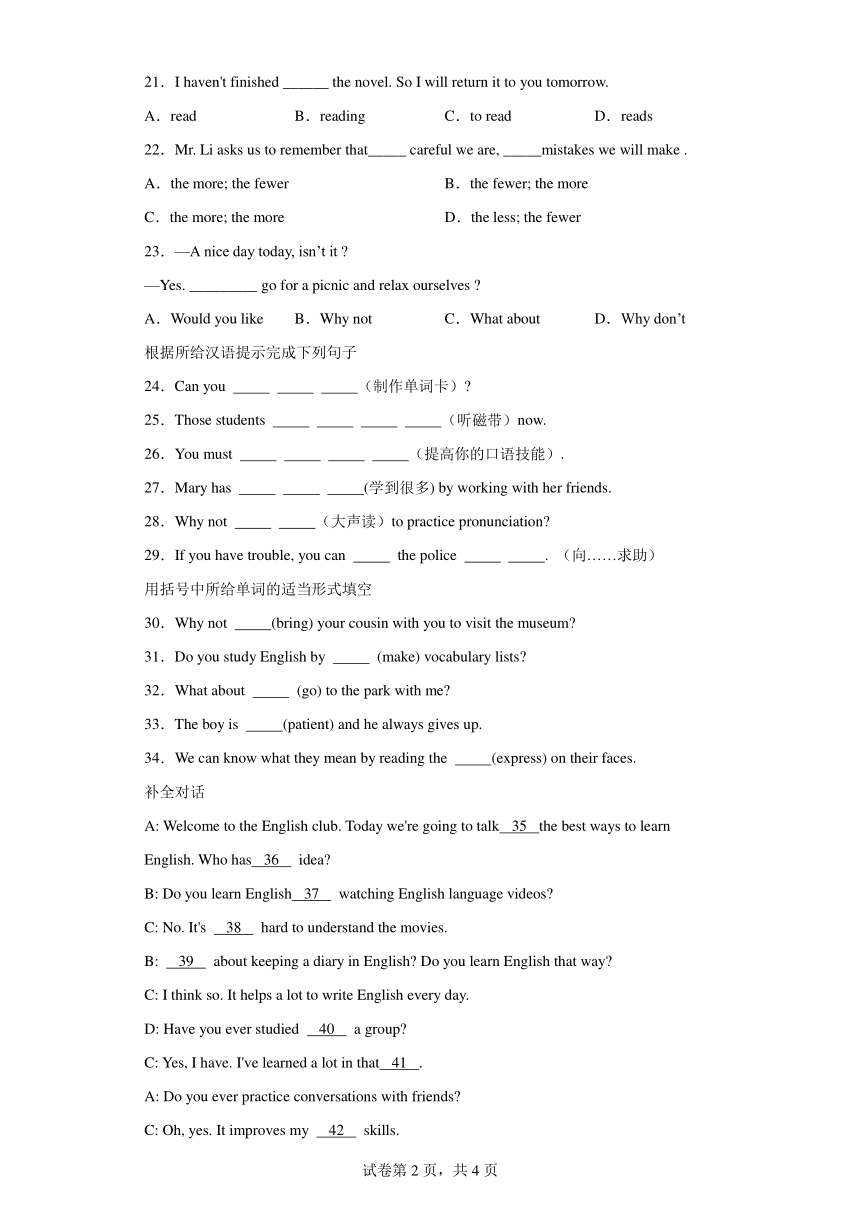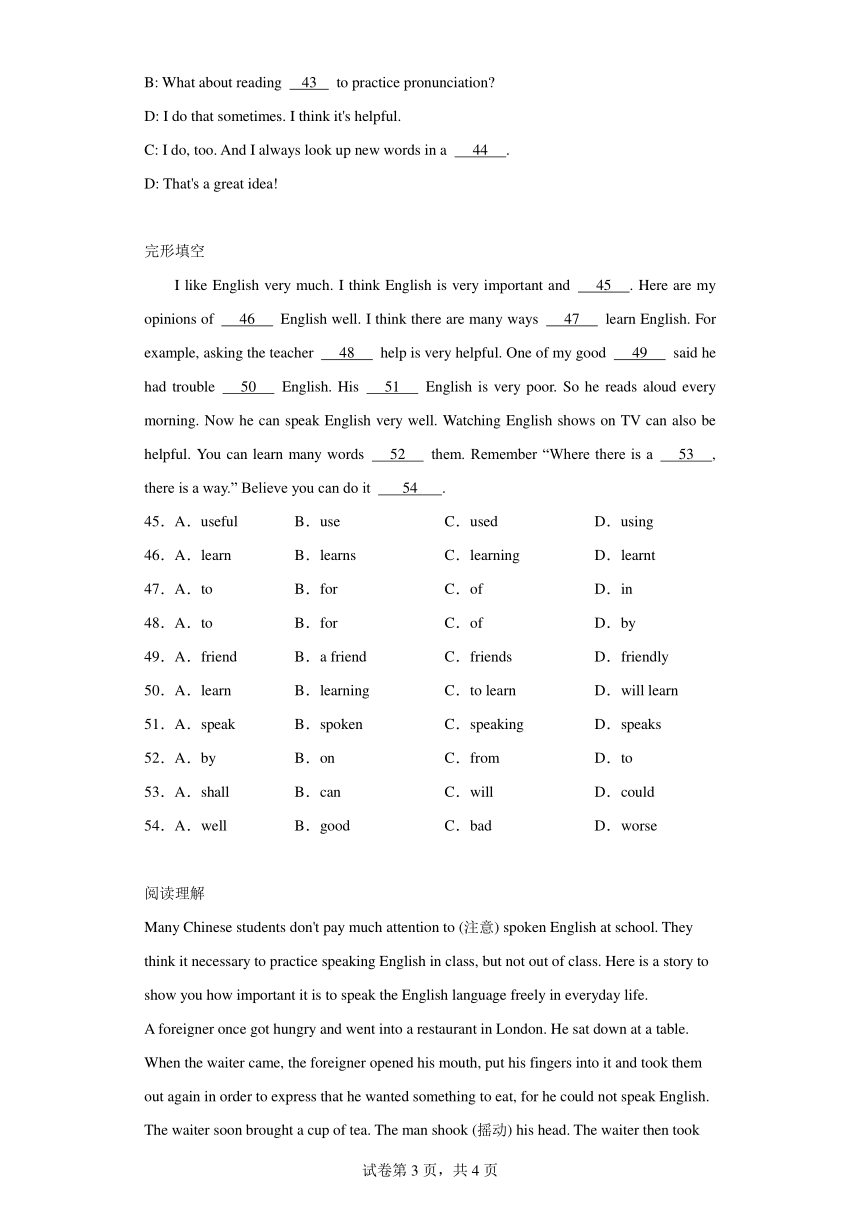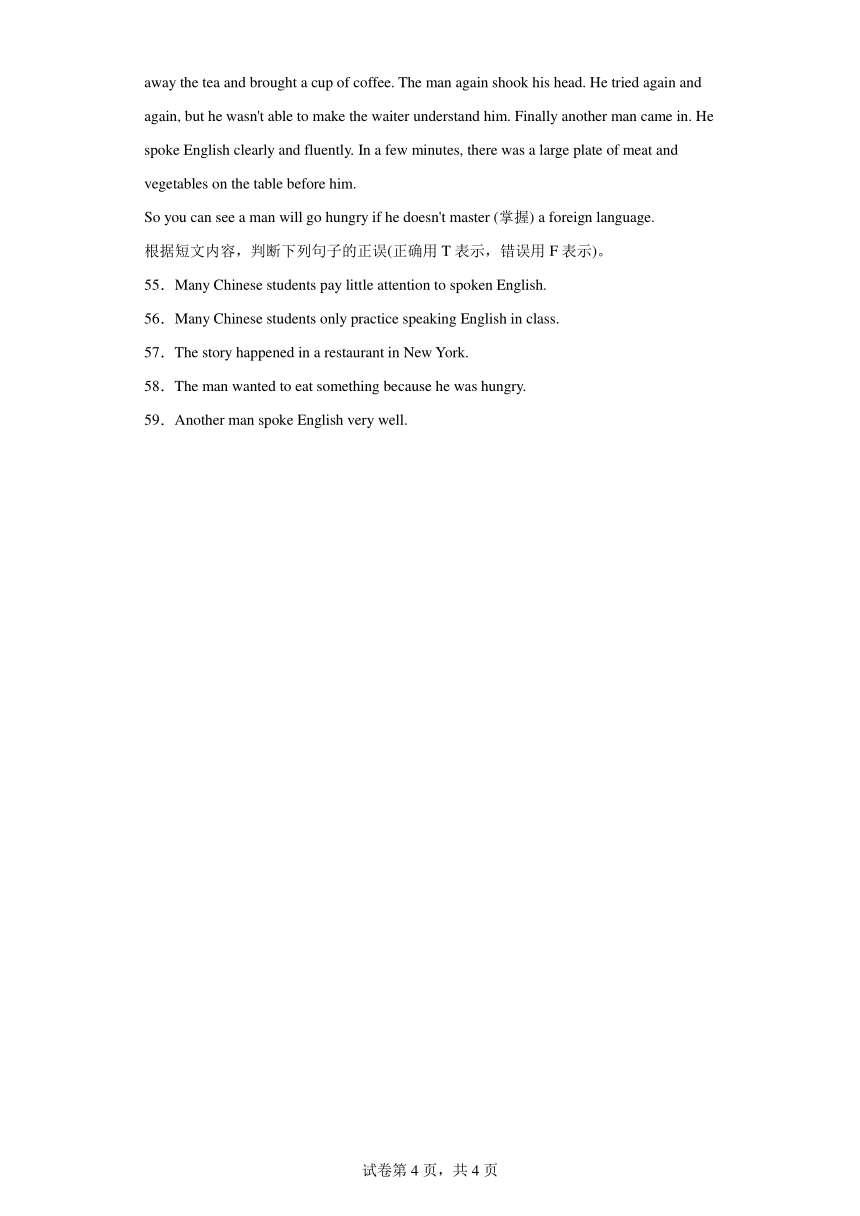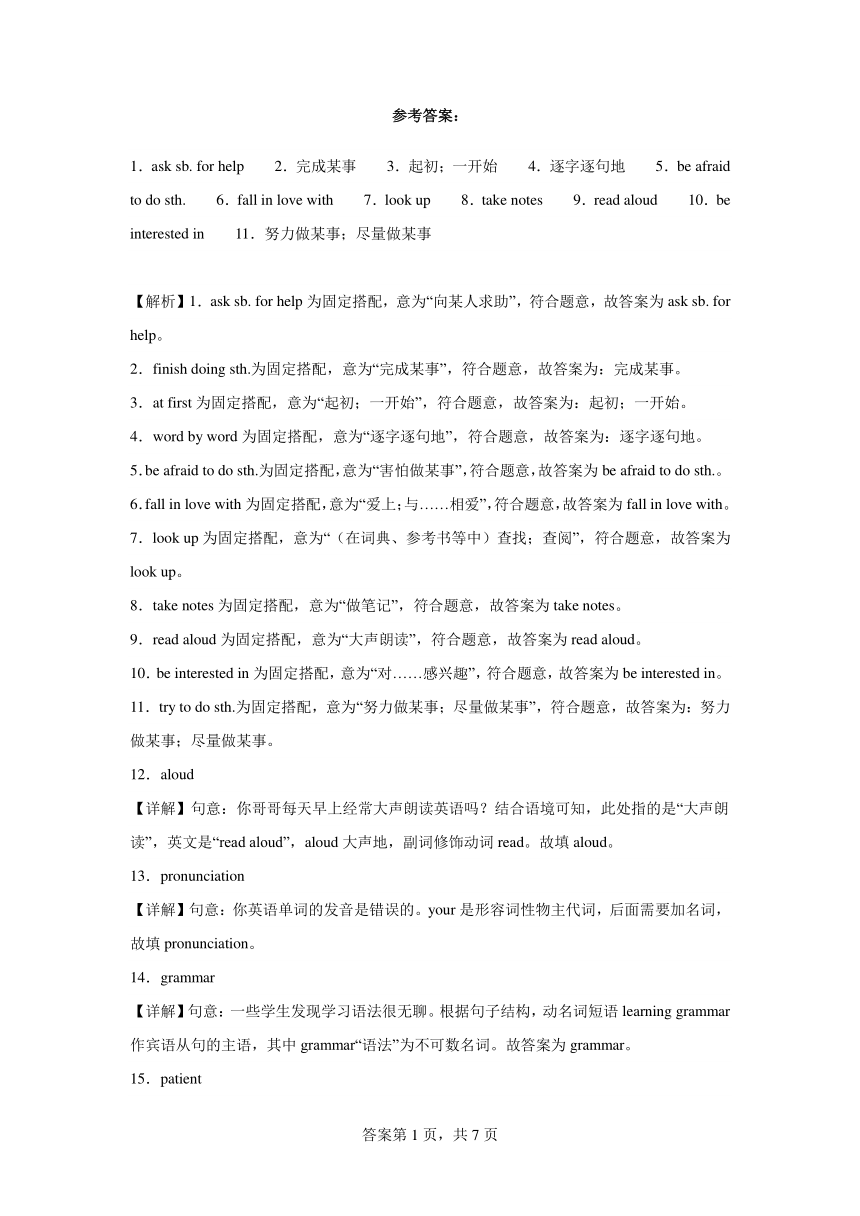人教新目标版 九年级英语 Unit 1 How can we become good learners?SectionA 同步练习
文档属性
| 名称 | 人教新目标版 九年级英语 Unit 1 How can we become good learners?SectionA 同步练习 |  | |
| 格式 | docx | ||
| 文件大小 | 28.4KB | ||
| 资源类型 | 教案 | ||
| 版本资源 | 人教新目标(Go for it)版 | ||
| 科目 | 英语 | ||
| 更新时间 | 2023-12-05 10:00:13 | ||
图片预览





文档简介
Unit 1 Section A
英汉短语互译
1.向某人求助
2.finish doing sth.
3.at first
4.word by word
5.害怕做某事
6.爱上;与……相爱
7.(在词典、参考书等中)查找;查阅
8.做笔记
9.大声朗读
10.对……感兴趣
11.try to do sth.
根据句意和所给首字母或汉语提示完成句中所缺单词
12.Does your brother often read English a every morning
13.Your (发音)of the English word is wrong.
14.Some students found learning (语法) is boring. Do you think so
15.As a teacher, you should be (耐心的)with your students.
16.—How old are you, madam
—Oh, it is my s .
单项选择
17.You can improve your English _________ practicing more.
A.by B.with C.of D.in
18.You don’t have to _______ every new word in the dictionary while reading.
A.look for B.look up C.look at D.look after
19.—I didn't hear you come in just now.
—That's good. We tried________any noise, for you were sleeping.
A.not make B.not to make C.to make D.making
20.Why not ______ your teacher for help when you can't finish ______ the story by yourself
A.to ask, write B.to ask; to write C.ask; writing D.asking; to write
21.I haven't finished ______ the novel. So I will return it to you tomorrow.
A.read B.reading C.to read D.reads
22.Mr. Li asks us to remember that_____ careful we are, _____mistakes we will make .
A.the more; the fewer B.the fewer; the more
C.the more; the more D.the less; the fewer
23.—A nice day today, isn’t it
—Yes. _________ go for a picnic and relax ourselves
A.Would you like B.Why not C.What about D.Why don’t
根据所给汉语提示完成下列句子
24.Can you (制作单词卡)
25.Those students (听磁带)now.
26.You must (提高你的口语技能).
27.Mary has (学到很多) by working with her friends.
28.Why not (大声读)to practice pronunciation
29.If you have trouble, you can the police . (向……求助)
用括号中所给单词的适当形式填空
30.Why not (bring) your cousin with you to visit the museum
31.Do you study English by (make) vocabulary lists
32.What about (go) to the park with me
33.The boy is (patient) and he always gives up.
34.We can know what they mean by reading the (express) on their faces.
补全对话
A: Welcome to the English club. Today we're going to talk 35 the best ways to learn English. Who has 36 idea
B: Do you learn English 37 watching English language videos
C: No. It's 38 hard to understand the movies.
B: 39 about keeping a diary in English Do you learn English that way
C: I think so. It helps a lot to write English every day.
D: Have you ever studied 40 a group
C: Yes, I have. I've learned a lot in that 41 .
A: Do you ever practice conversations with friends
C: Oh, yes. It improves my 42 skills.
B: What about reading 43 to practice pronunciation
D: I do that sometimes. I think it's helpful.
C: I do, too. And I always look up new words in a 44 .
D: That's a great idea!
完形填空
I like English very much. I think English is very important and 45 . Here are my opinions of 46 English well. I think there are many ways 47 learn English. For example, asking the teacher 48 help is very helpful. One of my good 49 said he had trouble 50 English. His 51 English is very poor. So he reads aloud every morning. Now he can speak English very well. Watching English shows on TV can also be helpful. You can learn many words 52 them. Remember “Where there is a 53 , there is a way.” Believe you can do it 54 .
45.A.useful B.use C.used D.using
46.A.learn B.learns C.learning D.learnt
47.A.to B.for C.of D.in
48.A.to B.for C.of D.by
49.A.friend B.a friend C.friends D.friendly
50.A.learn B.learning C.to learn D.will learn
51.A.speak B.spoken C.speaking D.speaks
52.A.by B.on C.from D.to
53.A.shall B.can C.will D.could
54.A.well B.good C.bad D.worse
阅读理解
Many Chinese students don't pay much attention to (注意) spoken English at school. They think it necessary to practice speaking English in class, but not out of class. Here is a story to show you how important it is to speak the English language freely in everyday life.
A foreigner once got hungry and went into a restaurant in London. He sat down at a table. When the waiter came, the foreigner opened his mouth, put his fingers into it and took them out again in order to express that he wanted something to eat, for he could not speak English. The waiter soon brought a cup of tea. The man shook (摇动) his head. The waiter then took away the tea and brought a cup of coffee. The man again shook his head. He tried again and again, but he wasn't able to make the waiter understand him. Finally another man came in. He spoke English clearly and fluently. In a few minutes, there was a large plate of meat and vegetables on the table before him.
So you can see a man will go hungry if he doesn't master (掌握) a foreign language.
根据短文内容,判断下列句子的正误(正确用T表示,错误用F表示)。
55.Many Chinese students pay little attention to spoken English.
56.Many Chinese students only practice speaking English in class.
57.The story happened in a restaurant in New York.
58.The man wanted to eat something because he was hungry.
59.Another man spoke English very well.
试卷第1页,共3页
试卷第1页,共3页
参考答案:
1.ask sb. for help 2.完成某事 3.起初;一开始 4.逐字逐句地 5.be afraid to do sth. 6.fall in love with 7.look up 8.take notes 9.read aloud 10.be interested in 11.努力做某事;尽量做某事
【解析】1.ask sb. for help为固定搭配,意为“向某人求助”,符合题意,故答案为ask sb. for help。
2.finish doing sth.为固定搭配,意为“完成某事”,符合题意,故答案为:完成某事。
3.at first为固定搭配,意为“起初;一开始”,符合题意,故答案为:起初;一开始。
4.word by word为固定搭配,意为“逐字逐句地”,符合题意,故答案为:逐字逐句地。
5.be afraid to do sth.为固定搭配,意为“害怕做某事”,符合题意,故答案为be afraid to do sth.。
6.fall in love with为固定搭配,意为“爱上;与……相爱”,符合题意,故答案为fall in love with。
7.look up为固定搭配,意为“(在词典、参考书等中)查找;查阅”,符合题意,故答案为look up。
8.take notes为固定搭配,意为“做笔记”,符合题意,故答案为take notes。
9.read aloud为固定搭配,意为“大声朗读”,符合题意,故答案为read aloud。
10.be interested in为固定搭配,意为“对……感兴趣”,符合题意,故答案为be interested in。
11.try to do sth.为固定搭配,意为“努力做某事;尽量做某事”,符合题意,故答案为:努力做某事;尽量做某事。
12.aloud
【详解】句意:你哥哥每天早上经常大声朗读英语吗?结合语境可知,此处指的是“大声朗读”,英文是“read aloud”,aloud大声地,副词修饰动词read。故填aloud。
13.pronunciation
【详解】句意:你英语单词的发音是错误的。your是形容词性物主代词,后面需要加名词,故填pronunciation。
14.grammar
【详解】句意:一些学生发现学习语法很无聊。根据句子结构,动名词短语learning grammar作宾语从句的主语,其中grammar“语法”为不可数名词。故答案为grammar。
15.patient
【详解】句意:作为老师,你应该对学生有耐心。联系句意并根据汉语提示“耐心的”,结合关键词be,可知此处应该用“耐心的”形容词形式patient,在句中作表语,be patient with“对……有耐心”,故填patient。
16.secret
【详解】句意:——女士,你多大了?——哦,它是我的秘密。根据问句,结合首字母提示,推测答语句意是“哦,它是我的秘密。”secret“秘密”,可数名词,前面的主语是第三人称单数it,因此空格处用单数名词secret,和主语it保持“数”的一致,故填secret。
17.A
【详解】试题分析:句意:你可以通过更多的练习来提高你的英语。improve your English 提高你的英语;by +doing 表示通过某种方式。故选A。
考点:考查介词的用法。
18.B
【详解】句意为:你读书的时候没有必要在词典中查阅每一个生词。
A. look for寻找;B. look up查找;C. look at看;D. look after照料。根据You don’t have to _______ every new word in the dictionary while reading. 你读书的时候没有必要在词典中_______ 每一个生词。可知,应该选择look up查找;符合题意。故选B。
19.B
【详解】句意:——我刚才没听见你进来。——那很好。我们尽量不弄出声音来,因为你在睡觉。
考查非谓语。短语try (not) to do sth.:尽力(不)做某事;根据下文“因为你在睡觉”可知“我们尽量不弄出声音来”,故选B。
20.C
【详解】句意:当你自己不能写完这个故事时,为什么不去找你的老师寻求帮助呢?
考查句型why not do sth.和非谓语动词。根据“why not do sth.”为什么不做某事,固定句型,所以第一空用动词原形;根据“finish doing sth”完成某事,固定短语,所以第二空填动名词作宾语;故选C。
21.B
【详解】句意:我还没有读完这本小说。所以我明天会还给你。
考查动词非谓语。finish的用法:finish+动名词(动词的ing)作宾语,finish doing sth.意为“完成做某事”,故选B。
22.A
【分析】
【详解】句意:李老师让我们记住:我们越是认真,我们犯的错误就会越少。
考查形容词辨析。the more越多;the less 越少,修饰不可数名词;the fewer越少,修饰可数名词复数。the +形容词比较级,the+形容词比较级,越……,就越……,是一个固定的句型。第一空后是形容词careful,比较级在前面加more;第二个空后是可数名词复数mistakes,用fewer修饰。故选A。
23.B
【详解】句意:——今天天气很好,不是吗?——是的。为什么不去野餐,放松一下自己?
考查固定句式。Would you like to do sth你想做某事吗;Why not do sth为什么不做某事;What about……怎么样;Why don’t you do sth为什么你不做某事。空格后接动词原形go,所以此空填why not,故选B。
24. make word cards
【详解】句意:你能制作单词卡片吗?情态动词can后接原形动词;make cards/a card制作卡片,固定表达。句中的“单词”是名词做定语,故填make; word; cards。
25. are listening to tapes
【详解】句意:那些学生们正在听磁带。听磁带listen to tapes;根据“now”可知,时态是现在进行时,结构是:be +V-ing;主语是“Those students”,所以be动词用are;listen变成listening。故填are;listening;to;tapes。
26. improve your speaking skills
【详解】句意:你必须提高你的口语技能。improve提高,your你的,speaking skills口语技能。根据句子结构,空格前为情态动词must,故动词improve应用原形。故答案为improve;your;speaking;skills。
27. learned/ learnt a lot
【详解】句意:玛丽通过和朋友们一起工作学到了很多东西。learn a lot意为“学到很多”,且位于“has done”现在完成时结构中,故动词learn应用过去分词形式,故答案为learned/ learnt;a;lot。
28. read aloud
【详解】句意:为什么不大声朗读来练习发音呢?大声读read aloud;“why not do sth.”表示“为什么不做某事”,固定用法,故填read;aloud。
29. ask for help
【详解】句意:如果你有麻烦,你可以向警察求助。“向……求助”英文表达是ask…for help,情态动词can后接动词原形,故填ask;for;help。
30.bring
【详解】句意:为什么不和你表姐一起去参观博物馆呢?Why not do sth. 为固定句型,意为“为什么不做某事呢?”,故动词bring应用原形,故答案为bring。
31.making
【详解】句意:你通过制作词汇表来学习英语吗?“by+V-ing”表示“通过某种方式”,动名词作宾语;make的动名词形式是making。故填making。
32.going
【详解】句意:和我一起去公园怎么样 what about+V-ing…?意为“做什么怎么样?”,表示提建议,about是介词,后接动词的ing形式,故填going。
33.impatient
【详解】句意:这个男孩很没耐心,总是放弃。根据句子结构,空格处应填形容词作表语,且下文he always gives up提示,男孩很没耐心,所以总是放弃,impatient作形容词,意为“没有耐心的”,符合句意,故答案为impatient。
34.expressions
【详解】句意:我们可以通过读他们脸上的表情来了解他们的意思。根据句子结构,空格处应填入名词。动词express的名词形式为expression,且根据on their faces可知,表情不止一种,故expression应用复数形式,故答案为expressions。
35.about 36.an 37.by 38.too 39.What 40.with 41.way 42.speaking 43.aloud 44.dictionary
【分析】本文是一则四人长对话,谈论了英语学习的好方法。
35.根据talk the best ways to learn English可知是谈论学英语的最好方法,talk about sth.谈论某事。故填about。
36.idea主意/想法,以元音音素开头的单数名词,需用不定冠词an修饰,故填an。
37.根据题干Do you learn English watching English language videos 可知设空处表方式;介词by表方式,后接动名词,故填by。
38.根据题干It's hard to understand the movies.可知是“too…to太……而不能”结构,这里表示看懂电影太难了,故填too。
39.根据题干 about keeping a diary in English 可知是建议用英语记日记;what about doing做某事怎么样,用于提建议;句首单词的首字母需大写,故填What。
40.根据题干Have you ever studied a group 可知是参加小组学习,with表示“和……一起”,故填with。
41.根据上文Have you ever studied with a group可知C认为参加英语小组学习的方式让自己学到了很多,that修饰单数名词。故填way。
42.句中的it是指上文“practice conversations with friends和朋友练习对话”;根据题干It improves my skills.,可知练习对话提高了口语能力;speaking skills口语技能,故填speaking。
43.read读,动词需用副词修饰;根据题干What about reading to practice pronunciation 可知建议大声朗读练习发音,read aloud大声朗读,故填aloud。
44.不定冠词a修饰单数名词;根据上文I always look up new words可知在字典里查新单词,故填dictionary。
45.A 46.C 47.A 48.B 49.C 50.B 51.B 52.C 53.C 54.A
【分析】本文是一篇记叙文,作者介绍了自己对英语的看法以及学好英语的一些建议。
45.句意:我认为英语很重要也很有用。
useful有用的,形容词;use使用,动词;used用过的,形容词;using动词use的现在分词。根据上文I like English very much. I think English is very important可知,作者很喜欢英语,并认为英语是很重要的,故此处应填一个褒义形容词,即“有用的”,故选A。
46.句意:以下是我对学好英语的看法。
learn学习,动词;learns学习,动词第三人称单数;learning学习,现在分词以及动名词形式;learnt学习,过去式和过去分词。空格前为介词of,故应用动词learn的现在分词形式,故选C。
47.句意:我认为学习英语有很多方法。
to到……;for为了;of……的;in在……里。结合空格前后,ways to do sth.意为“做某事的方法”,不定式作后置定语,故选A。
48.句意:向老师求助是很有帮助的。
to到……;for为了;of……的;by通过。ask sb. for help为固定搭配,意为“向某人求助”,符合句意,故选B。
49.句意:我的一个好朋友说他学英语有困难。
friend朋友,名词;a friend一个朋友;friends朋友们,名词复数;friendly友好的,形容词。根据One of提示,此处位于“one of +可数名词复数”结构中,意为“……中的一个”,故选C。
50.句意:我的一个好朋友说他学英语有困难。
learn学习,动词;learning动词learn的现在分词以及动名词形式;to learn动词不定式;will learn表一般将来时。have trouble (in) doing sth.为固定结构,意为“做某事有困难”,符合句意,故选B。
51.句意:他的英语口语很差。
speak说,动词;spoken动词speak的过去分词;speaking动词speak的现在分词以及动名词形式;speaks动词speak第三人称单数。根据下文So he reads aloud every morning可知,他每天都大声朗读英语,故此处说的是他的口语很差。spoken English意为“英语口语”,名词短语,speaking English意为“说英语”,为“现在分词+ English”结构,重点在speak这个动作上,根据句子结构,空格前为形容词性物主代词his,空格处应填名词,故选B。
52.句意:你可以从他们那里学到很多单词。
by通过;on在……上;from来自;to到……。根据上文Watching English shows on TV can also be helpful可知,作者推荐多看电视上的英语节目,可以从中学到很多单词。learn from为固定搭配,意为“向……学习”,故选C。
53.句意:记住“有志者事竟成”。
shall应该;can能够;will意愿;could可以。根据常识可知,此处是一句谚语Where there is a will, there is a way,即“有志者,事竟成”。故选C。
54.句意:相信自己能做好。
well好的,副词;good好的,形容词;bad坏的,形容词;worse更糟糕的,形容词比较级。根据上文Remember “Where there is a will, there is a way.”可知,结尾处作者鼓励读者要相信自己能学好英语,且根据句子结构,空格处应填入副词修饰动词do,故选A。
55.T 56.T 57.F 58.T 59.T
【分析】本文通过讲述一个外国人在伦敦餐馆吃饭,因为不会说英语,没有点到食物。而另一个人说英语说得非常好,因此他点到了他想要的食物。这个故事告诉我们在日常生活中,流利地说英语是非常重要的。
55.根据Many Chinese students don't pay much attention to (注意) spoken English at school可知许多中国学生不太注意英语口语,故此处与原文一致,故为T。
56.根据They think it necessary to practice speaking English in class, but not out of class.可知许多中国学生只在班上练习说英语,故此处与原文一致,故为T。
57.根据A foreigner once got hungry and went into a restaurant in London.可知这个故事发生在伦敦,不是在纽约,故此处与原文不符,故为F。
58.根据When the waiter came, the foreigner opened his mouth, put his fingers into it and took them out again in order to express that he wanted something to eat, for he could not speak English.可知那个男人想要吃的东西,因为他饿了,故此处与原文一致,故为T。
59.根据Finally another man came in. He spoke English clearly and fluently.可知另一个男人说英语说得非常好,故此处与原文一致,故为T。
【点睛】认真阅读题干,把题干的内容在原文找出对应的句子或段落,进行分析理解,概括归纳和比较,判断出正确与错误。例如小题3,根据A foreigner once got hungry and went into a restaurant in London.可知这个故事发生在伦敦,不是在纽约,故此处与原文不符,故为F。
答案第1页,共2页
答案第1页,共2页
英汉短语互译
1.向某人求助
2.finish doing sth.
3.at first
4.word by word
5.害怕做某事
6.爱上;与……相爱
7.(在词典、参考书等中)查找;查阅
8.做笔记
9.大声朗读
10.对……感兴趣
11.try to do sth.
根据句意和所给首字母或汉语提示完成句中所缺单词
12.Does your brother often read English a every morning
13.Your (发音)of the English word is wrong.
14.Some students found learning (语法) is boring. Do you think so
15.As a teacher, you should be (耐心的)with your students.
16.—How old are you, madam
—Oh, it is my s .
单项选择
17.You can improve your English _________ practicing more.
A.by B.with C.of D.in
18.You don’t have to _______ every new word in the dictionary while reading.
A.look for B.look up C.look at D.look after
19.—I didn't hear you come in just now.
—That's good. We tried________any noise, for you were sleeping.
A.not make B.not to make C.to make D.making
20.Why not ______ your teacher for help when you can't finish ______ the story by yourself
A.to ask, write B.to ask; to write C.ask; writing D.asking; to write
21.I haven't finished ______ the novel. So I will return it to you tomorrow.
A.read B.reading C.to read D.reads
22.Mr. Li asks us to remember that_____ careful we are, _____mistakes we will make .
A.the more; the fewer B.the fewer; the more
C.the more; the more D.the less; the fewer
23.—A nice day today, isn’t it
—Yes. _________ go for a picnic and relax ourselves
A.Would you like B.Why not C.What about D.Why don’t
根据所给汉语提示完成下列句子
24.Can you (制作单词卡)
25.Those students (听磁带)now.
26.You must (提高你的口语技能).
27.Mary has (学到很多) by working with her friends.
28.Why not (大声读)to practice pronunciation
29.If you have trouble, you can the police . (向……求助)
用括号中所给单词的适当形式填空
30.Why not (bring) your cousin with you to visit the museum
31.Do you study English by (make) vocabulary lists
32.What about (go) to the park with me
33.The boy is (patient) and he always gives up.
34.We can know what they mean by reading the (express) on their faces.
补全对话
A: Welcome to the English club. Today we're going to talk 35 the best ways to learn English. Who has 36 idea
B: Do you learn English 37 watching English language videos
C: No. It's 38 hard to understand the movies.
B: 39 about keeping a diary in English Do you learn English that way
C: I think so. It helps a lot to write English every day.
D: Have you ever studied 40 a group
C: Yes, I have. I've learned a lot in that 41 .
A: Do you ever practice conversations with friends
C: Oh, yes. It improves my 42 skills.
B: What about reading 43 to practice pronunciation
D: I do that sometimes. I think it's helpful.
C: I do, too. And I always look up new words in a 44 .
D: That's a great idea!
完形填空
I like English very much. I think English is very important and 45 . Here are my opinions of 46 English well. I think there are many ways 47 learn English. For example, asking the teacher 48 help is very helpful. One of my good 49 said he had trouble 50 English. His 51 English is very poor. So he reads aloud every morning. Now he can speak English very well. Watching English shows on TV can also be helpful. You can learn many words 52 them. Remember “Where there is a 53 , there is a way.” Believe you can do it 54 .
45.A.useful B.use C.used D.using
46.A.learn B.learns C.learning D.learnt
47.A.to B.for C.of D.in
48.A.to B.for C.of D.by
49.A.friend B.a friend C.friends D.friendly
50.A.learn B.learning C.to learn D.will learn
51.A.speak B.spoken C.speaking D.speaks
52.A.by B.on C.from D.to
53.A.shall B.can C.will D.could
54.A.well B.good C.bad D.worse
阅读理解
Many Chinese students don't pay much attention to (注意) spoken English at school. They think it necessary to practice speaking English in class, but not out of class. Here is a story to show you how important it is to speak the English language freely in everyday life.
A foreigner once got hungry and went into a restaurant in London. He sat down at a table. When the waiter came, the foreigner opened his mouth, put his fingers into it and took them out again in order to express that he wanted something to eat, for he could not speak English. The waiter soon brought a cup of tea. The man shook (摇动) his head. The waiter then took away the tea and brought a cup of coffee. The man again shook his head. He tried again and again, but he wasn't able to make the waiter understand him. Finally another man came in. He spoke English clearly and fluently. In a few minutes, there was a large plate of meat and vegetables on the table before him.
So you can see a man will go hungry if he doesn't master (掌握) a foreign language.
根据短文内容,判断下列句子的正误(正确用T表示,错误用F表示)。
55.Many Chinese students pay little attention to spoken English.
56.Many Chinese students only practice speaking English in class.
57.The story happened in a restaurant in New York.
58.The man wanted to eat something because he was hungry.
59.Another man spoke English very well.
试卷第1页,共3页
试卷第1页,共3页
参考答案:
1.ask sb. for help 2.完成某事 3.起初;一开始 4.逐字逐句地 5.be afraid to do sth. 6.fall in love with 7.look up 8.take notes 9.read aloud 10.be interested in 11.努力做某事;尽量做某事
【解析】1.ask sb. for help为固定搭配,意为“向某人求助”,符合题意,故答案为ask sb. for help。
2.finish doing sth.为固定搭配,意为“完成某事”,符合题意,故答案为:完成某事。
3.at first为固定搭配,意为“起初;一开始”,符合题意,故答案为:起初;一开始。
4.word by word为固定搭配,意为“逐字逐句地”,符合题意,故答案为:逐字逐句地。
5.be afraid to do sth.为固定搭配,意为“害怕做某事”,符合题意,故答案为be afraid to do sth.。
6.fall in love with为固定搭配,意为“爱上;与……相爱”,符合题意,故答案为fall in love with。
7.look up为固定搭配,意为“(在词典、参考书等中)查找;查阅”,符合题意,故答案为look up。
8.take notes为固定搭配,意为“做笔记”,符合题意,故答案为take notes。
9.read aloud为固定搭配,意为“大声朗读”,符合题意,故答案为read aloud。
10.be interested in为固定搭配,意为“对……感兴趣”,符合题意,故答案为be interested in。
11.try to do sth.为固定搭配,意为“努力做某事;尽量做某事”,符合题意,故答案为:努力做某事;尽量做某事。
12.aloud
【详解】句意:你哥哥每天早上经常大声朗读英语吗?结合语境可知,此处指的是“大声朗读”,英文是“read aloud”,aloud大声地,副词修饰动词read。故填aloud。
13.pronunciation
【详解】句意:你英语单词的发音是错误的。your是形容词性物主代词,后面需要加名词,故填pronunciation。
14.grammar
【详解】句意:一些学生发现学习语法很无聊。根据句子结构,动名词短语learning grammar作宾语从句的主语,其中grammar“语法”为不可数名词。故答案为grammar。
15.patient
【详解】句意:作为老师,你应该对学生有耐心。联系句意并根据汉语提示“耐心的”,结合关键词be,可知此处应该用“耐心的”形容词形式patient,在句中作表语,be patient with“对……有耐心”,故填patient。
16.secret
【详解】句意:——女士,你多大了?——哦,它是我的秘密。根据问句,结合首字母提示,推测答语句意是“哦,它是我的秘密。”secret“秘密”,可数名词,前面的主语是第三人称单数it,因此空格处用单数名词secret,和主语it保持“数”的一致,故填secret。
17.A
【详解】试题分析:句意:你可以通过更多的练习来提高你的英语。improve your English 提高你的英语;by +doing 表示通过某种方式。故选A。
考点:考查介词的用法。
18.B
【详解】句意为:你读书的时候没有必要在词典中查阅每一个生词。
A. look for寻找;B. look up查找;C. look at看;D. look after照料。根据You don’t have to _______ every new word in the dictionary while reading. 你读书的时候没有必要在词典中_______ 每一个生词。可知,应该选择look up查找;符合题意。故选B。
19.B
【详解】句意:——我刚才没听见你进来。——那很好。我们尽量不弄出声音来,因为你在睡觉。
考查非谓语。短语try (not) to do sth.:尽力(不)做某事;根据下文“因为你在睡觉”可知“我们尽量不弄出声音来”,故选B。
20.C
【详解】句意:当你自己不能写完这个故事时,为什么不去找你的老师寻求帮助呢?
考查句型why not do sth.和非谓语动词。根据“why not do sth.”为什么不做某事,固定句型,所以第一空用动词原形;根据“finish doing sth”完成某事,固定短语,所以第二空填动名词作宾语;故选C。
21.B
【详解】句意:我还没有读完这本小说。所以我明天会还给你。
考查动词非谓语。finish的用法:finish+动名词(动词的ing)作宾语,finish doing sth.意为“完成做某事”,故选B。
22.A
【分析】
【详解】句意:李老师让我们记住:我们越是认真,我们犯的错误就会越少。
考查形容词辨析。the more越多;the less 越少,修饰不可数名词;the fewer越少,修饰可数名词复数。the +形容词比较级,the+形容词比较级,越……,就越……,是一个固定的句型。第一空后是形容词careful,比较级在前面加more;第二个空后是可数名词复数mistakes,用fewer修饰。故选A。
23.B
【详解】句意:——今天天气很好,不是吗?——是的。为什么不去野餐,放松一下自己?
考查固定句式。Would you like to do sth你想做某事吗;Why not do sth为什么不做某事;What about……怎么样;Why don’t you do sth为什么你不做某事。空格后接动词原形go,所以此空填why not,故选B。
24. make word cards
【详解】句意:你能制作单词卡片吗?情态动词can后接原形动词;make cards/a card制作卡片,固定表达。句中的“单词”是名词做定语,故填make; word; cards。
25. are listening to tapes
【详解】句意:那些学生们正在听磁带。听磁带listen to tapes;根据“now”可知,时态是现在进行时,结构是:be +V-ing;主语是“Those students”,所以be动词用are;listen变成listening。故填are;listening;to;tapes。
26. improve your speaking skills
【详解】句意:你必须提高你的口语技能。improve提高,your你的,speaking skills口语技能。根据句子结构,空格前为情态动词must,故动词improve应用原形。故答案为improve;your;speaking;skills。
27. learned/ learnt a lot
【详解】句意:玛丽通过和朋友们一起工作学到了很多东西。learn a lot意为“学到很多”,且位于“has done”现在完成时结构中,故动词learn应用过去分词形式,故答案为learned/ learnt;a;lot。
28. read aloud
【详解】句意:为什么不大声朗读来练习发音呢?大声读read aloud;“why not do sth.”表示“为什么不做某事”,固定用法,故填read;aloud。
29. ask for help
【详解】句意:如果你有麻烦,你可以向警察求助。“向……求助”英文表达是ask…for help,情态动词can后接动词原形,故填ask;for;help。
30.bring
【详解】句意:为什么不和你表姐一起去参观博物馆呢?Why not do sth. 为固定句型,意为“为什么不做某事呢?”,故动词bring应用原形,故答案为bring。
31.making
【详解】句意:你通过制作词汇表来学习英语吗?“by+V-ing”表示“通过某种方式”,动名词作宾语;make的动名词形式是making。故填making。
32.going
【详解】句意:和我一起去公园怎么样 what about+V-ing…?意为“做什么怎么样?”,表示提建议,about是介词,后接动词的ing形式,故填going。
33.impatient
【详解】句意:这个男孩很没耐心,总是放弃。根据句子结构,空格处应填形容词作表语,且下文he always gives up提示,男孩很没耐心,所以总是放弃,impatient作形容词,意为“没有耐心的”,符合句意,故答案为impatient。
34.expressions
【详解】句意:我们可以通过读他们脸上的表情来了解他们的意思。根据句子结构,空格处应填入名词。动词express的名词形式为expression,且根据on their faces可知,表情不止一种,故expression应用复数形式,故答案为expressions。
35.about 36.an 37.by 38.too 39.What 40.with 41.way 42.speaking 43.aloud 44.dictionary
【分析】本文是一则四人长对话,谈论了英语学习的好方法。
35.根据talk the best ways to learn English可知是谈论学英语的最好方法,talk about sth.谈论某事。故填about。
36.idea主意/想法,以元音音素开头的单数名词,需用不定冠词an修饰,故填an。
37.根据题干Do you learn English watching English language videos 可知设空处表方式;介词by表方式,后接动名词,故填by。
38.根据题干It's hard to understand the movies.可知是“too…to太……而不能”结构,这里表示看懂电影太难了,故填too。
39.根据题干 about keeping a diary in English 可知是建议用英语记日记;what about doing做某事怎么样,用于提建议;句首单词的首字母需大写,故填What。
40.根据题干Have you ever studied a group 可知是参加小组学习,with表示“和……一起”,故填with。
41.根据上文Have you ever studied with a group可知C认为参加英语小组学习的方式让自己学到了很多,that修饰单数名词。故填way。
42.句中的it是指上文“practice conversations with friends和朋友练习对话”;根据题干It improves my skills.,可知练习对话提高了口语能力;speaking skills口语技能,故填speaking。
43.read读,动词需用副词修饰;根据题干What about reading to practice pronunciation 可知建议大声朗读练习发音,read aloud大声朗读,故填aloud。
44.不定冠词a修饰单数名词;根据上文I always look up new words可知在字典里查新单词,故填dictionary。
45.A 46.C 47.A 48.B 49.C 50.B 51.B 52.C 53.C 54.A
【分析】本文是一篇记叙文,作者介绍了自己对英语的看法以及学好英语的一些建议。
45.句意:我认为英语很重要也很有用。
useful有用的,形容词;use使用,动词;used用过的,形容词;using动词use的现在分词。根据上文I like English very much. I think English is very important可知,作者很喜欢英语,并认为英语是很重要的,故此处应填一个褒义形容词,即“有用的”,故选A。
46.句意:以下是我对学好英语的看法。
learn学习,动词;learns学习,动词第三人称单数;learning学习,现在分词以及动名词形式;learnt学习,过去式和过去分词。空格前为介词of,故应用动词learn的现在分词形式,故选C。
47.句意:我认为学习英语有很多方法。
to到……;for为了;of……的;in在……里。结合空格前后,ways to do sth.意为“做某事的方法”,不定式作后置定语,故选A。
48.句意:向老师求助是很有帮助的。
to到……;for为了;of……的;by通过。ask sb. for help为固定搭配,意为“向某人求助”,符合句意,故选B。
49.句意:我的一个好朋友说他学英语有困难。
friend朋友,名词;a friend一个朋友;friends朋友们,名词复数;friendly友好的,形容词。根据One of提示,此处位于“one of +可数名词复数”结构中,意为“……中的一个”,故选C。
50.句意:我的一个好朋友说他学英语有困难。
learn学习,动词;learning动词learn的现在分词以及动名词形式;to learn动词不定式;will learn表一般将来时。have trouble (in) doing sth.为固定结构,意为“做某事有困难”,符合句意,故选B。
51.句意:他的英语口语很差。
speak说,动词;spoken动词speak的过去分词;speaking动词speak的现在分词以及动名词形式;speaks动词speak第三人称单数。根据下文So he reads aloud every morning可知,他每天都大声朗读英语,故此处说的是他的口语很差。spoken English意为“英语口语”,名词短语,speaking English意为“说英语”,为“现在分词+ English”结构,重点在speak这个动作上,根据句子结构,空格前为形容词性物主代词his,空格处应填名词,故选B。
52.句意:你可以从他们那里学到很多单词。
by通过;on在……上;from来自;to到……。根据上文Watching English shows on TV can also be helpful可知,作者推荐多看电视上的英语节目,可以从中学到很多单词。learn from为固定搭配,意为“向……学习”,故选C。
53.句意:记住“有志者事竟成”。
shall应该;can能够;will意愿;could可以。根据常识可知,此处是一句谚语Where there is a will, there is a way,即“有志者,事竟成”。故选C。
54.句意:相信自己能做好。
well好的,副词;good好的,形容词;bad坏的,形容词;worse更糟糕的,形容词比较级。根据上文Remember “Where there is a will, there is a way.”可知,结尾处作者鼓励读者要相信自己能学好英语,且根据句子结构,空格处应填入副词修饰动词do,故选A。
55.T 56.T 57.F 58.T 59.T
【分析】本文通过讲述一个外国人在伦敦餐馆吃饭,因为不会说英语,没有点到食物。而另一个人说英语说得非常好,因此他点到了他想要的食物。这个故事告诉我们在日常生活中,流利地说英语是非常重要的。
55.根据Many Chinese students don't pay much attention to (注意) spoken English at school可知许多中国学生不太注意英语口语,故此处与原文一致,故为T。
56.根据They think it necessary to practice speaking English in class, but not out of class.可知许多中国学生只在班上练习说英语,故此处与原文一致,故为T。
57.根据A foreigner once got hungry and went into a restaurant in London.可知这个故事发生在伦敦,不是在纽约,故此处与原文不符,故为F。
58.根据When the waiter came, the foreigner opened his mouth, put his fingers into it and took them out again in order to express that he wanted something to eat, for he could not speak English.可知那个男人想要吃的东西,因为他饿了,故此处与原文一致,故为T。
59.根据Finally another man came in. He spoke English clearly and fluently.可知另一个男人说英语说得非常好,故此处与原文一致,故为T。
【点睛】认真阅读题干,把题干的内容在原文找出对应的句子或段落,进行分析理解,概括归纳和比较,判断出正确与错误。例如小题3,根据A foreigner once got hungry and went into a restaurant in London.可知这个故事发生在伦敦,不是在纽约,故此处与原文不符,故为F。
答案第1页,共2页
答案第1页,共2页
同课章节目录
- Unit 1 How can we become good learners.
- Section A
- Section B
- Unit 2 I think that mooncakes are delicious!
- Section A
- Section B
- Unit 3 Could you please tell me where the restroom
- Section A
- Section B
- Unit 4 I used to be afraid of the dark.
- Section A
- Section B
- Unit 5 What are the shirts made of?
- Section A
- Section B
- Review of Units 1-5
- Unit 6 When was it invented?
- Section A
- Section B
- Unit 7 Teenagers should be allowed to choose their
- Section A
- Section B
- Unit 8 It must belong to Carla.
- Section A
- Section B
- Unit 9 I like music that I can dance to.
- Section A
- Section B
- Unit 10 You're supposed to shake hands.
- Section A
- Section B
- Review of Units 6-10
- Unit 11 Sad movies make me cry.
- Section A
- Section B
- Unit 12 Life is full of the unexpected
- Section A
- Section B
- Unit 13 We're trying to save the earth!
- Section A
- Section B
- Unit 14 I remember meeting all of you in Grade 7.
- Section A
- Section B
- Review of Units 11-14
